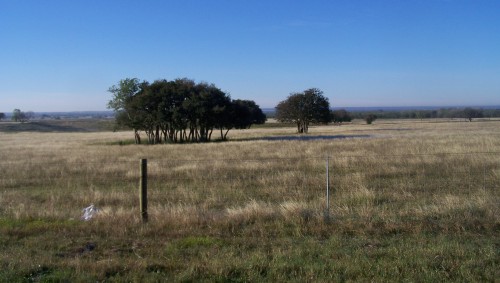
This last Saturday was the second day of Christmas on the Square in Goliad, Texas. I had a table there, as a local author, but the cold was so pronounced that the whole event was rather a bust … but it did mean that folding up and coming home early allowed some time for taking pictures on the way back. This is a part of Texas which overlies the Eagle Ford Shale formation, and over the last five years I have noted a good many changes along the route, and in the small towns that we pass through on a semi-regular basis.
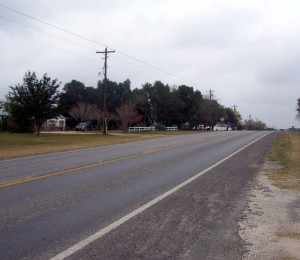
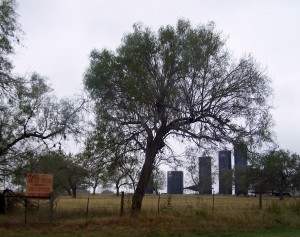
The working places usually are the center of a constellation of metal sheds, pole barns and tractors and other agricultural implements, usually in a slightly rusty condition.
There is only one classically spare-no-expense grand Texas mansion in this part of the country; a lavish pile with ground to roof-edge columns all the way around. It was built by a restaurant magnate in Karnes City some years ago, but only lived in for a few years. It’s been empty and on the market ever since. Frankly, this is single or double-wide trailer country. Not that there’s anything wrong with that. The most prosperous businesses in these little towns often appear to be the gas station mini-marts on the outskirts, if it isn’t the feed store. Any restaurant in a town is most likely to be a BBQ place … or a bar, sometimes in one and the same premises. Residents in little towns like Falls City think the world of their high school football team … and in many cases, don’t even bother locking their house doors.
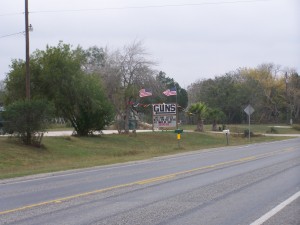
Contra a good few decades of disparaging portrayals in movies and television, they are nice people; friendly and outgoing, helpful to strangers, too. One spring when we headed out to Goliad for an event, Blondie’s Montero broke the belt that worked the air conditioner. We popped up the hood in the local supermarket parking lot to investigate matters, and within five minutes, a nice lady appeared and offered to take me to the only auto supply store in town which had replacement belts and by the time we returned, one of the nice lady’s acquaintances appeared and offered to install it for us. (Nice lady was Hispanic; the acquaintance whom she vouched for — was Anglo; this is one of those places where race relations are everything that we once fondly hoped they would be. Turned out that acquaintance was a military veteran, so were some of his friends who turned up while he was wrestling with the belt system. We wound up regaling each other with tales of service. The way to the heart of small-town Texans is to be a military veteran.)
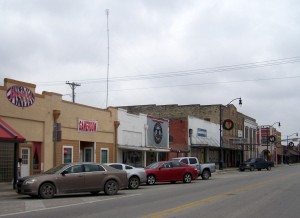
Four or five years ago, many of the little towns along Route 181, through Poth and Karnes City and Kenedy, or by other routes through Smiley or Stockdale and Nixon looked if they were dying on the vine. There were so many crumbling storefronts and the ones open for some kind of business presented a more forlorn aspect than the ones which had given up the ghost and boarded up entirely. Weekday or weekend these towns were deserted by mid-afternoon. Even the parking lot of the Walmart in Kenedy was all but deserted the first couple of times we drove past. 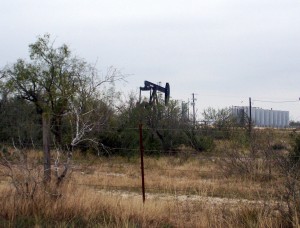
Over the following years, the aspect along the roads to Goliad, or to Beeville, or Port Lavaca changed; not suddenly or with any catastrophic effect just gradually. Among the cattle, the oak trees and the small hiccups of towns were now rocking-horse pumpjacks, nodding busily away. There were oilfield developments, truck parks and wells, dotted here and there among the pastures and brushlands; newly paved and graveled, lit up boldly at night.
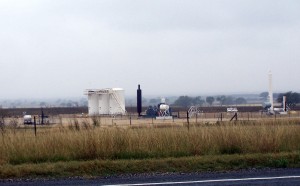
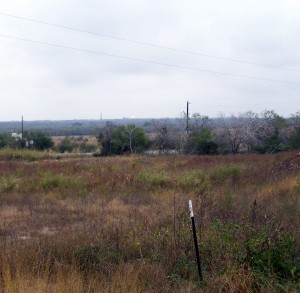
There was a little more traffic on the roads especially of tanker trucks and the small towns didn’t look so forlorn; the crumbling motel was suddenly rehabbed, and a number of new cabin-style units added to the row of existing roomettes. There were lights in the café, new vehicles parked out front, and several new RV parks on the outside of town which, since there were no golf-courses, lakes or riverfront attractions were obviously intended for workers and not vacationers.
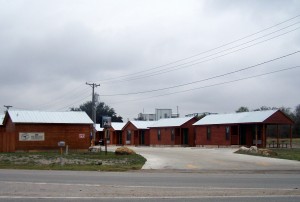
New housing developments had been established outside of Karnes City and Poth and the Walmart parking lot was full. We remarked on this to some old friends in Goliad long-time residents, who confirmed our observations. They told us of neighbors and residents who had owned country acreage and been scraping by on a shoestring for decades. Now they had regular and generous checks from leasing their land for shale oil development. On the whole, I think this is a darned good thing; this new oil boom has bought some prosperity to places that hadn’t seen much of it lately, without doing much damage that I can see from the roadside.
And, of course, Obama is taking credit for it.
Well, seeing that he can’t stop it, as it is just about all on private property, he may as well take credit for something that really is working. Law of averages has caught up to him.
I have not been through Poth and Falls City in over 25 years. I bet I would not recognize the places now.
Rural depopulation is the norm in Britain, in France, in Italy ”¦.
In attractive countryside, urban people buy the properties. In ugly, or particularly remote, country everything becomes dilapidated.
France is becoming repopulated with the retiring British middle class. They want no part of violent, gun free Britain and the NHS. France is having problems with them all signing up for the far superior French health care system. Too bad we didn’t use France as a model.
A lot of rural Texas is becoming re-populated; the parts in the more scenic hills (which are not particularly scenic as rural landscapes go)are reviving as bedroom communities for cities like Austin, San Marcos and San Antonio. The smaller towns in the Hills are reviving with urbanites and retirees – the Pedernales Valley, for instance, is turning into wine country. I wonder if some of it isn’t people wanting to get away from the massive urban centers. I did some book club meetings with readers who were recent arrivals in the Hill Country … and had read my books as a way of getting into the history of the place they had moved to. That bit of the country north of San Antonio is the more middle-class, trendy and artistic part.
This part – south of San Antonio – is a bit more blue-collar and grittier. The scenery is a little flatter, and still nothing spectacular. Not even very remote – but they have also revived because of the shale boom. Karnes City, Kenedy, Poth, Beeville, Goliad – all look a bit perkier than they were five or six years ago. Some of the homes along the roads do look a bit sad, but many of them are very well-kept, and some are even brand-spanking new. Of course, that’s only the ones that we notice from the road.
Oh, and Falls City is still very, very proud of their high school football team. The Beavers. We still snicker guiltily when we drive through and see the proud home-town billboards on display.
“Texas: Where else can one see so far and see so little?”
– Mark Twain
“this is single or double-wide trailer country. Not that there’s anything wrong with that.”
Tornadoes?
The idea that British people retire to France because Britain is gun-free is, um, what’s a polite word? Demented?
Too far south for tornados, Robert. And the hurricanes are usually pretty well blunted by the time the get this far inland.
Oh, and Falls City is still very, very proud of their high school football team. The Beavers. We still snicker guiltily when we drive through and see the proud home-town billboards on display.
You have a dirty mind……. ;-)
No worse than my old home town of Garden City, proud 6 man state champs 2009 and 2010. When I went back home for Dad’s funeral last January, I had not been there since 2008. I almost did not recognize the place. It was booming.
Dearie, please explain why they are emigrating. The gun ban has only created a more violent atmosphere in London, for example. In much of England the culture has degenerated and Theodore Dalrymple has written a number of books about it. Labour imported a new electorate, just as the Democrats are trying t do here, and it has had a number of discouraging effects.
For example, a friend of mine, a world renowned surgeon, tells me that they cannot get Muslim women doctors and nurses to scrub their arms. This has had a significant effect in the increasing rate of hospital infections. I spend time in Britain most years and have noticed the decline in knowledge of history by the people I meet.
I didn’t mean the gun ban, itself, was the cause. Only that it has contributed to the decline. When I was in London a couple of years ago, a home invasion robbery resulted in the death of a prominent man. It was in Chelsea, a wealthy area. I would not walk across central London late at night as I used to do 30 years ago. Would you ?
Everyone’s opinions vary, fairly regularly between the ranges of -10 and +10, meaning one person sees free national healthcare and gun-free society as an absolute necessity and another wants zero government and a return to the old west. I’m a return-to-the-old-west guy, sorry.
I read Sgt. Mom’s words and loved them. The description of the old Vs. the new is spot-on in my eyes.
I celebrate (and wish well for) anyone who writes– and writes in complete and beautiful sentences, regardless to the bite of the message. There’s no “solution” to the world’s problems, only fixes and partial repairs. As long as I refuse to wear fuscia to a funeral….wait….as long as I refuse to do anything, or refuse to consider anything then I’m part of the very problem that I might see, correct?
Love life and be kind and be flexible. Live frugally.
For a start, there is no gun ban. Pistols are banned. (Which means, as you know, that they are banned from the law-abiding.)
If I wanted a shotgun I’d get a certificate for it easily as long as I could demonstrate that I had a safe, locking cabinet to keep it in, and some legitimate purpose. Shooting game, or shooting vermin, would do. If I wanted a rifle, I should think I’d get a licence straightforwardly – at least so people have told me on the web when I’ve lamented selling my rifle and letting my licence lapse decades ago. I’d simply say that I wanted to take up competitive shooting again. If I did buy one, I’d possibly store it at a nearby gun club/shooting range or, if I really wanted it at home, I would again buy an approved cabinet.
Mostly people retire to France for the wonderfully cheap rural property: the better health service is probably also an attraction. If they want heat they tend to go to Spain (the best part of France for heat-seekers is the Cote d’Azure, which is impossibly expensive). Personally, if I wanted to live on the Continent I’d be torn between France (because I could probably relearn to speak French pretty quickly – I can still read it fairly well) and Italy (for the sheer bloody beauty and the food).
There is an element of “white flight” no doubt, but it seems unlikely to me that reversing the ban on pistols would reverse it; on the matter of population replacement, the pass has been sold.